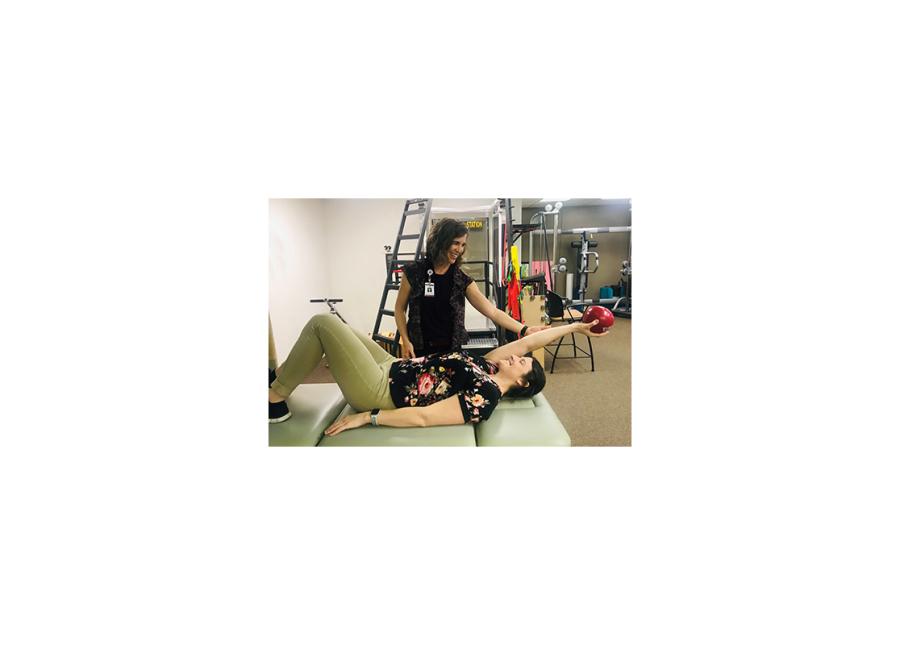Has an injury left you sidelined? Do minor aches and pains keep you from doing what you love? Are you having pain after cancer surgery? If so, then you could be a candidate for physical therapy.
While people often think physical therapy is reserved for those who are recovering from a major accident, sports injury or orthopedic surgery, its benefits extend to a much broader audience.
From work-related aches, to painful side effects from recreational activities, sports, or gym and weightlifting regimens, there are many non-medical reasons for which a person may benefit from physical therapy.
Incorporating physical therapy at the onset of pain or chronic aches could prevent the need for more aggressive or invasive medical interventions. The key, experts say, is to nip minor issues in the bud before they become major ones.
Madeline Ogles, PT, a physical therapist at HonorHealth Outpatient Therapy – South Tempe, says physical therapy offers a wealth of corrective and preventive benefits.
"Physical therapy is for almost anyone who's unable to fully participate in daily tasks or activities they enjoy because of pain or irritation," she notes. "Sometimes people don't think their condition warrants treatment, but after an assessment we find that minor adjustments to correct poor posture or address weakness in a certain group of muscles can be a game changer."
Ultimately, Ogles says it's important to be proactive and not wait until movement becomes limited or pain becomes almost unbearable to seek professional help.
HonorHealth offers individualized physical therapy from evaluation through treatment
The one-to-one provider to patient ratio sets HonorHealth apart from many other physical therapy centers that have therapists or technicians work with multiple patients simultaneously.
"Our training in pathology allows us to assess a person's unique presentation of symptoms and causes, which helps us determine which areas of the body to target," explains Kelly Chavez-Allen, PT, DPT, another physical therapist at HonorHealth Outpatient Therapy – South Tempe. "We look at the patient as a whole. If your hand hurts, we may find that we need to start by working on your shoulders, neck or back."
Both therapists stress the value of tailoring treatment plans to the individual needs of each patient.
"What might work for one person could be ineffective or even detrimental for another," Ogles explains.
"We maintain a one-on-one treatment approach from the patient's first evaluation appointment throughout their treatment plan," Chavez-Allen notes. "Our patients always see and work directly with a physical therapist."
The attention afforded by HonorHealth's one-on-one approach gives therapists the opportunity to confirm that patients fully understand and properly execute the exercises and treatments prescribed. Ogles and Chavez-Allen say poor execution could diminish treatment benefits or, in some cases, be harmful to a patient.
Improving quality of life for cancer patients before and after treatment
While physical therapy is widely known for its role in recovering from orthopedic surgery, Chavez-Allen says it's beneficial in treating many other medical conditions and addressing certain treatment side effects. One example is its role in improving quality of life for cancer patients.
Chavez-Allen, whose training includes breast cancer rehabilitation certification, says physical therapy offers many benefits for cancer patients across the board.
"There's a huge group of people who have completed cancer treatment and are left with pain, stiffness, fatigue, chemotherapy-induced neuropathy (constant numbness in the hands and feet), and decreased quality of life," she says. "We can often reduce those side effects with physical therapy. There's actually a big push to incorporate physical therapy from the time of diagnosis and the beginning of cancer treatment."
Specific to breast cancer patients, Chavez-Allen says physical therapy has shown to help restore shoulder mobility, and reduce numbness and tingling.
"Exercise in general decreases cancer recurrence rates," she says. "Knowing how to exercise safely after cancer surgery is important, and that's something we are trained to help with."
